|
  Lucy Harbin (Joan
Crawford) is released from a hospital for the criminally insane after
twenty years and is reunited with her now-grown daughter, Carol (Diane
Baker), who lives with Bill Cutler (Leif Erickson) and his wife, Emily (Rochelle
Hudson). Lucy Harbin (Joan
Crawford) is released from a hospital for the criminally insane after
twenty years and is reunited with her now-grown daughter, Carol (Diane
Baker), who lives with Bill Cutler (Leif Erickson) and his wife, Emily (Rochelle
Hudson).
Two decades before, Lucy had discovered her
young husband and his lady-love of the moment in bed together, and in a rage
had hacked them to death with an axe. The crime had been witnessed by
Carol, then only three years old. A note of uneasiness and foreboding
is struck as soon as Lucy comes home from the hospital. For one thing,
Carol wants Lucy to stop dressing in a drab, middle-aged fashion and begin
wearing glamorous black wigs and tight-fitting frocks and making like the
woman she once was. Lucy feels Carol is trying to brighten her morale
by suggesting more youthful apparel, and assumes the manners, appearance,
and dress of a woman twenty years younger, with sometimes disconcerting
results.
A series of incidents reveal that Lucy is still
far from well. For one thing, she makes brazen romantic passes at her
daughter's handsome young fiancée,
Michael Fields (John Anthony Hayes), and when she is taken to visit
Michael's snobbish and cautious parents, Mrs. Fields (Edith Atwater) angers
Lucy, who goes into a tantrum.
A series of axe murders begins, including that
of Leo Krause, the hired man (George Kennedy). Meanwhile a doctor from
the hospital (Mitchell Cox) has looked in on Lucy from time to time and is
not satisfied with her progress. Everything seems to point to Lucy as
the axe murderess, but at the end it is Carol who is revealed as the killer.
Her three-year-old mind, long years before, had registered the murder of her
father and his mistress by her mother with a clarity and vividness that in
time became pathological, and a saddened Lucy is forced to realize that that
long-ago event has made her pathetic daughter a hopeless psychotic.What was said about
Strait-Jacket:
  Time Magazine Time Magazine
"It must also be the first horror film able to boast that one of its diehard
victims (Mitchell Cox) is a real life Vice President of the Pepsi-Cola Company.
As for Pepsi-Cola Board Member Crawford, she plainly plays her mad scenes For
Those Who Think Jung."
Variety
"Miss Crawford does well by her role, delivering an animated performance."
New York Herald Tribune (Judith Crist)
"Strait-Jacket should be subtitled What Ever Happened to Baby
Monster? and there's a clue for you. (It) proves that lightning does
not strike twice and that it's time to get
Joan Crawford out of those housedress horror B movies and back into haute
couture. Miss Crawford, you see, is high class. Too high class to
withstand in mufti the banality of Robert Bloch's script, cheap-jack production,
inept and/or vacuous supporting players and direction better suited to the
mist-and-cobweb idiocies of the Karloff school of suspense. These make a
disappointing, low-level melodrama of this madness-and-murder tale that might
have been a thriller, given Class A treatment...Miss Crawford is without peer
when it comes to diffident neuroses, valiant ears, and prideful motherhood, and
she's awfully good to look at even in her gray-haired, disheveled,
fresh-from-the-asylum drabness. But what she does need here is a peer or
two to sustain the credibility of the build-up as well as the final twist."
Daily News
"The star is hampered by a script riddled with clichés."
Films in Review (Elaine Rothschild)
"I must say I am full of admiration for
Joan Crawford, for even in drek [sic] like this she gives a performance.
|
